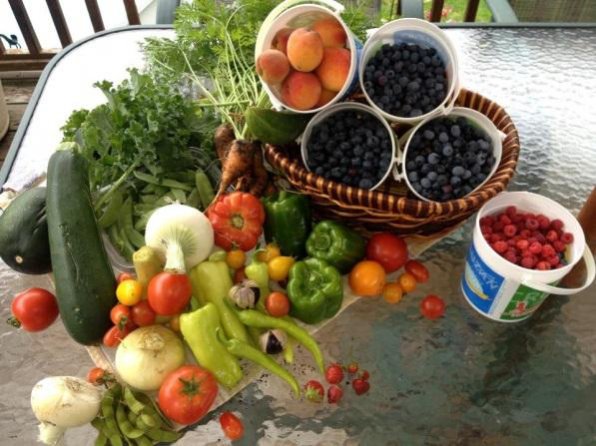My gardening experience has been spending time outside enjoying nature learning from my parents (Bob and Cheryl Rossman), local farmers and myself. Each year we learn something new, and as a gardening family we adjust our techniques to improve our harvest. My parents and I spend our time together planting and harvesting in the garden, making healthy meals and storing healthy food to last throughout the year.
Gardening is truly something anyone can do. It can be a stress reliever with nature’s beauty, peaceful sounds and the nutritious bounty it provides.
You don’t need any prior experience or access to a big yard to grow locally. Gardening can be planting flowers, herbs, vegetables, fruits and more. More people are planting in window boxes, food grade FDA approved 5 gallon buckets, large pots and burlap bags. You can grow on your driveway and even on top of the roof when the conditions are right! Be creative and ask the experts in your area for advice. All you need is access to sun, healthy nutrient-dense soil, water and a love of being successful.
If you are new to gardening, I would recommend attending a local class to gain some basic information and to get inspired about the possibilities before beginning. Options include The Cooperative Extension, local garden club (Successfully Growing Heirloom Tomatoes with Rusty’s in Bow – May 11) and the Center for Health Promotion at Concord Hospital (Home Gardening 101 class on April 29).
Another great way to learn about gardening is from the farmers who are experts, local nurseries, greenhouses, master gardeners and plant sellers like Rusty’s Heirloom Tomatoes. Attend your local farmers market in the beginning of the season when they are selling their seedlings/starter plants. Decide what you’d like to plant and go from there – you, too, will learn what works and what doesn’t.
If all you have access to is a sunny driveway, make a trip to Lowes to buy 5-gallon FDA approved food-grade buckets or go to your local bakery and ask for the buckets. Make holes in the bottom for drainage, either with a drill or with a nail and hammer, and grow the plants in the buckets with some healthy soil.
Healthy soil is a must. “You feed the soil not the plant,” according to Rusty’s Heirloom Tomatoes. “You will want to know the compilation of your soil – sand, silt, clay mixtures, and what you may need to add or adjust to get the right pH for growing.”
My dad always taught me to test the soil for pH before planting. You will figure out if the soil is suitable for growing. My family learned a few years ago from Rusty’s that if you are using the raised bed technique, add organic compost at the end of the season to the top of the soil to foster nutrient dense soil (grass clippings, leaves, pine needles, etc.).
More wisdom from Rusty’s: “Healthy soil means healthy plants, healthy plants means healthy nutrient-dense food.” The layer of compost/mulch on the top of the soil is essential for a worm population (worms help decompose the mulch and spread nutrients into the soil for healthy growth), minimizing weeds, and preventing evaporation by keeping moisture and heat in; lastly the compost/mulch keeps soilborne organisms from affecting the plants.
Water and the amount, and duration of sunlight are also important. Some plants need more sunlight than others to grow. You will want to plant your garden strategically to avoid shadowing certain plants, giving the plants the proper amount of sunlight.
The key is to stay positive and try to learn new techniques from the experts in your area. If you aren’t looking to garden yourself, there are other options: Farm Shares and CSA. The bottom line is grow when you can, purchase local when you can, enjoy the food you eat, eat mindfully and know where your food comes from. I hope to see you at my Home Gardening 101 class April 29 at 6:30 p.m. at the Center for Health Promotion. To pre-register, call 230-7300.
The Capital Area Wellness Coalition coordinates community resources and builds partnerships to create a culture of healthy living for everyone. The coalition meets monthly on the second Wednesday at 8 a.m. at the Center for Health Promotion, 49 S. Main St. For more information, visit capwellness.org.









